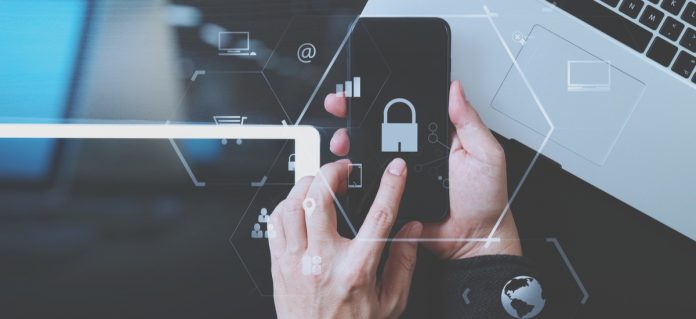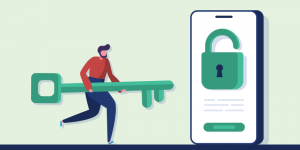Table of Contents
Smartphone Security Guide
Mobile vulnerability is an all-time risk as your data is always at a threat for viruses or cyberattacks. Breached once, and you will lose all the private information your device has. These threats are constantly evolving and tuning grounded on your everyday practices.
However, fortunately, effective ways can protect all the data your digital footprint holds from these hazards.
Below are ways to block your data from falling into the wrong hands. These are some primary defense measures that your smartphone needs to protect data from viruses and create a blockade between you and hackers that intend to penetrate your private information.
Always Add A Pin Code

According to a recent study, over 50% of Americans don’t set up a pin code on their smartphones, making their data open to violation and breaching.
Locking your phone with a password is the easiest way to protect your data is from unwelcome usage. Apart from pin code, most smartphones have personalized patterns that makes access to the cellphone screen covered and prevent flouting. You can also go for fingerprint lock if your cellphone supports biometric technology. This kind of lock is hassle-free and brings the best security for your confidential records.
However, adding a lock to your mobile phones doesn’t make your data fully protected. It would be best if you also went for a SIM card lock, so your information is least bare to the thief.
Set Secure Passwords

When protecting your sensitive data with security codes, go for robust passwords that are harder for hackers to guesstimate.
Strong passwords safeguarding your apps are crucial to be knotted and complicated. Experts also suggest that all of your apps should be secured using a different password so the chopper can’t crack them, or if by chance they succeed to break, they won’t have entree to all your information. To make your passwords more secure, avoid adding common phrases or numerical or alphabetical sequences. Instead, enhance your pin code’s complexity by amalgamating a few characters from numbers, alphabets, and punctuations. You can also consider adding a mixture of uppercase and lowercase letters, which will make your password more assuring.
Encrypt Your Data

Since your smartphone can contain many of your confidential records, it’s better to protect your mobile phone, ensuring your data is encrypted. The data that is encrypted is put into code and amassed in an impassive form. This scribbled data can’t be seized or captured by hackers and provide robust security to personal information.
You can check on your phone and enable the encryption setting to save your data from losing to allow this program. The process nevertheless can take sixty minutes or more but is worth the wait.
Choose A Secure WiFi

Your smartphones are of no use if you don’t have access to internet connections wherever you go. Today, wireless networks have taken over the internet game, and where it’s beneficial for improved speed and data usage costs, it’s detrimental to your privacy concern. While your WiFi saves you on data, you must be cautious of an unsecured network that can carry away your confidential data without you knowing of it. To be more vigilant, be sure to connect to a VPN. The virtual private network protects your location and keeps your data from snooping eyes.
Install The Best Antivirus Application

People believe that antivirus tools are only for laptops and desktop computers, but your smartphones can also benefit them. Numerous applications can save your data from viruses and hacking threats. Some applications even offer additional features like call blocking, app lock, remote data wipe, etc.
According to Crowd Writer UK, the best practice is to look for the antivirus you are using for your desktop. Check if your favorite antivirus software has a mobile version and offers the finest security for your confidential data.
Keep The OS Up-To-Date

Keeping your smartphone operating system updated doesn’t only run your mobile phone smoothly but also entails security.
Any threats and risks that your data is vulnerable to is resolved with these update and must not overlook these updates whenever available. Staying up-to-date with your operating system can protect your data from newly discovered threats and resolves all your potential issues. To check if your phones’ OS is updated or not, you can go to the settings, check “about the phone,” and check “system updates.”
Beware Of Apps And Downloads

When you plan to download an app, make sure it’s from the official app store, and don’t forget to check the reviews. Applications not installed from trusted sources can throw up significant threats to cell phones and your private data.
However, downloading from official app stores can also not guarantee your safety; even the App Store and Play Store apps can be malicious; therefore, always check reviews. Cybercriminals often create cad apps that mimic trustworthy brands to get hold of users’ confidential information, so be watchful of the reviews, check ratings and look for the last update.
Backup Your Data

Backing up your data is essential to keep you protected from data theft. There are many ways you can lose all your data if not stored.
For instance, if your cellphone gets stolen or lost and gets into the wrong hand, you’ll get in trouble and face potential damage for not having all your essential documents handy. Also, smartphones today let users synchronize data with a computer or website for backup purposes. Synchronizing can include emails, photos, contacts, etc., so you can retrieve your critical data in any event of loss or theft.
With backup, you can also remotely destroy the data from your cellphone if it gets robbed or misplaced.
Don’t Root Or Jailbreak Your Phone.
Though rooting allows you to retrieve system-level resources, according to the research and experience of many unhappy phone owners, only experts or professionals aware of potential dangers should root your phones. Otherwise, if someone offers rooting for your phone while quoting benefits, beware! Jailbreaking and rooting open up the opportunity for potential infections and malware. Rooting can be pretty threatening to your critical and confidential data. The apps from these illegitimate stores are not inspected and can easily barge into your phone and hack personal information.
Set Your Bluetooth To Non-Discoverable Mode

Though Bluetooth offers significantly fewer chances for your data to be hacked or breached, you can not ignore it because attacks do happen, however.
When using this technology, you must be vigilant and know all pitfalls it can bring when left on and not abused.
Hackers with such smartphones work remotely. They unlawfully access the device to make phone calls, listen to conversations, browse the internet, access data, etc. that can bring destructive fallouts on your confidential information.





















